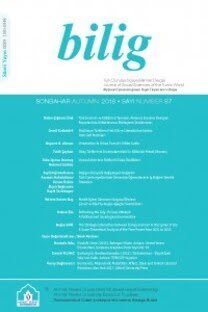Farabi’nin Epistemolojisindeki Aklın Özü ve Tipolojisi
Essence and Typology of Intellect in al-Farabi’s Epistemology
Ontology epistemology, cognition, human intellect, cosmology,
___
- Adamson, Peter and Richard C. Taylor (2005). The Cambridge Companion to Arabic Philosophy. Cambridge: Cambridge University Press.
- Adamson, Peter (2015). Philosophy in the Islamic World. Oxford: Oxford University Press.
- Alfarabi (2001). The Political Writings: “Selected Aphorisms” and Other Texts. Cornell University Press.
- Al-Farabi (1972). On the Meanings of the [Word] Intellect [in Russian] / О значениях [слова] интеллект. (in Russian). Alma-Ata: Nauka.
- Al-Farabi (1972). Principles of the Opinions of the Citizens of the Virtuous City. (in Russian). Alma-Ata: Nauka.
- Bertolacci, Amos (2012). “Arabic and Islamic Metaphysics”. Stanford Encyclopedia of Philosophy Archive.
- Black, Deborah L. (2006). Arabic Sciences and Philosophy. Cambridge: Cambridge University Press. 11-45.
- Colmo, Christopher. “Theory and Practice: Alfarabi’s Plato Revisited”. The American Political Science Review 86 (4): 966-976.
- Davidson, Herbert A. (1992). Alfarabi, Avicenna and Averroes on Intellect. Oxford: Oxford University Press.
- Fakhry, Majid (2002). Al-Farabi, Founder of Islamic Neoplatonism: His Life, Work and Influence. Oxford: OneWorld.
- Fakhry, Majid (2004). A history of Islamic philosophy. New York: Columbia University Press.
- Fakhry, Majid (1965). “Al-Farabi and the Reconciliation of Plato and Aristotle”. Journal of the History of Ideas 26 (4): 469-478.
- Kaukua, Jari and Tomas Ekenberg (2016). Subjectivity and Selfhood in Medieval and Early Modern Philosophy. Springer International Publishing Switzerland.
- Kaukua, Jari (2015). Self-Awareness in Islamic Philosophy: Avicenna and Beyond. Cambridge: Cambridge University Press.
- McGinnis, Jon and David C. Reisman (2007). Classical Arabic philosophy: an anthology of sources. Translated with introduction, notes, and glossary by Jon
- McGinnis and David C. Reisman. Indianapolis/Cambridge: Hackett Publishing Company.
- Rashed, Marwan (2009). “On the Authorship of the Treatise on the Harmonization of the Opinions of the Two Sages Attributed to al-Farabi”. Arabic Sciences and Philosophy 19: 43-82.
- ISSN: 1301-0549
- Yayın Aralığı: Yılda 4 Sayı
- Başlangıç: 1996
- Yayıncı: Ahmet Yesevi Üniversitesi
Bölgeler Arası Gelişmişlik Düzeylerinin Belirlenmesi ve Karşılaştırılması: Türkiye Örneği
Erken Dönem Azerbaycan Maarifçiliğinde Kültürel Kimlik Algısı
Türk Dünyasından Gelen Öğrencilerin Türkiye Türkçesi Metinlerine Yönelik Tutumları
Fahri TEMİZYÜREK, Muhammed Eyyüp SALLABAŞ
Farabi’nin Epistemolojisindeki Aklın Özü ve Tipolojisi
Zhakypbek ALTAEV, Aliya MASSALİMOVA, Assyl TULEUBEKOV, Aizhan DOSKOZHANOVA
Ortaçağ Taraz’da Son Arkeolojik Kazılar Sonucunda Bulunan Sikkeler Üzerine Bir İnceleme
Madiyar YELEUOV, Mirzahan EGAMBERDİYEV
Türk Düşüncesinde Devlet Algısı Bağlamında Bir Karşılaştırma Denemesi: Namık Kemal ve İbn Haldun
